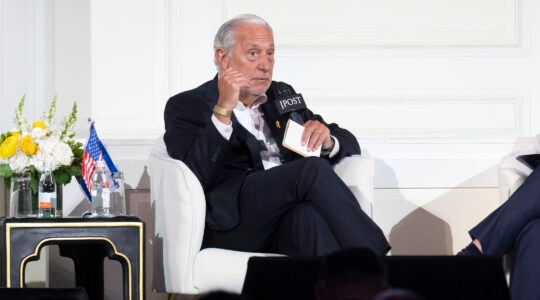This post is available to read at its rightful home, Jewcy.com, but because the site is still having some technical issues, we have it here for you to read as well.
According to Jewcy’s official statement, they’ve been "hacked by Antarctica based nihilists dressed in white bunny costumes. They can’t be found, but Jewcy’s growing IT team of MIT post-grads have almost resolved the issue."
On a more serious note. Here is idea #23, from Daniel Septimus and Jewcy:
Over the last several years, I have read dozens of articles and listened to scores of conversations about the challenge of strengthening Jewish identity in America. Indeed, since the 1990 National Jewish Population Survey canonized Jewish American assimilation, an unprecedented amount of communal dollars and efforts have been poured into this endeavor.
Programs aimed at "young Jews" are often explicitly framed as identity projects, a fact readily apparent from the mission statements of two of the most prominent and well-funded organizations serving the 18-30 crowd, Hillel and Birthright Israel.
Hillel "provides opportunities for Jewish students…to explore and celebrate their Jewish identity through its global network of regional centers." Birthright Israel aims "to strengthen participants’ personal Jewish identity."
This may seem neither controversial nor remarkable, but I believe that the obsessive focus on identity is both misguided and fundamentally alien to Jewish tradition.
What do organizations mean when they say they want to strengthen or cultivate Jewish identity?
At The Jewish Federations of North America’s General Assembly, in a panel on Jewish Peoplehood, Dr. Erica Brown noted that there are three components to identity formation: the cognitive (what we think), the behavioral (what we do), and the emotional (what we feel). In discussing some of the maladies plaguing the American Jewish community, Dr. Brown suggested an interesting diagnosis: when American Jews speak about Jewish identity they aggressively emphasize the emotional.
In other words, to too many American Jews, Jewish identity means feeling Jewish.
Dr. Brown’s insight articulated something I have been noticing for years and was, most recently, driven home during a conversation with a prominent Jewish philanthropist. As we spoke, this generous and committed Jewish leader extolled the virtues of Jewish education and lamented its current state. When I asked him what he wanted Jewish education to achieve-what its aim should be-his answer was simple: "I want Jewish kids to feel proud of being Jewish."
I, for my part, was stunned. Really? That’s it? That’s the goal of Jewish education, of all your philanthropic benevolence? A feeling of ethnic/religious/cultural pride?
This is merely one example, of course, but to appreciate the Jewish community’s excessive emotionalism-and its eschewal of the cognitive and behavioral aspects of identity formation-consider this: Could you imagine Birthright Israel’s mission statement asserting that it wanted to influence the thinking and behaviors of its participants? Surely, most American Jews would consider that paternalistic, if not creepy.
So what’s so bad about putting all of our eggs in the basket of emotional identity?
First, as Dr. Brown noted, it ignores the importance of "what we think" and "what we do."
Professor Steven M. Cohen has noted something similar. "In common parlance, ‘identity,’ has come to be understood as related primarily to intra-psychic feelings-the attitudes and sentiments felt within….But, in truth, Jewish identity extends (or ought to extend) beyond the affective. Being an ‘identified Jew’ is not just about feeling Jewish, but about expressing Jewish belonging and undertaking identifiably Jewish behaviors."
Secondly, valuing emotional identity as the fundamental aim of Jewish life is a recent phenomenon that has little precedent in Jewish tradition. It’s difficult for me to think of a single traditional Jewish text that discusses the importance of feeling Jewish. Not only is the centrality of emotional identity not rooted in Jewish tradition, it is likely an expression of our alienation from this tradition.
One might suggest as my friend Dr. Eliyahu Stern has that "identity is the language of those who have lost it." Or as Leon Wieseltier has written: "Where the words of the fathers are forgotten, there is still ethnic identity. The thinner the identity the louder."
Now, I do not believe that all contemporary Jewish expressions must be rooted in the past, and I do believe there are contemporary values-Jewish and secular-that should trump traditional Jewish ones, but the emotionalism that guides American Jews is not one of them.
The idea I’m suggesting here, then, is that we abandon the rhetoric of identity, that we stop programming and funding the goal of strengthening Jewish identity. I am not, however, suggesting that we abandon all the programs that mention Jewish identity building as their aim. These programs can-and usually do-have other goals, even if they are not always front and center in their mission statements. Additionally, since I am tearing down one of the primary frameworks of contemporary Judaism, let me offer an alternative.
The second mishnah in Pirkei Avot reports the following: "Shimon the Righteous was one of the last survivors of the Great Assembly. He used to say: The world is sustained on three things: on Torah, on the Temple service [avodah], and on deeds of loving kindness [gemilut hasadim]."
What are these three pillars?
- Torah, which includes education and study, the intellectual and cognitive aspects of Judaism.
- Avodah, which in Pirke Avot refers to the service of God as conducted in the Temple, but can generally encompass the religious, spiritual, and ritual aspects of Jewish life.
- Gemilut hasadim, which incorporates the ethical demands of Judaism-helping the poor, visiting the sick, fighting for the dignity of all.
I’d like to see the rhetoric of Jewish programming and funding guided by these three categories. Of course, there are other values that could be used as touchstones for Jewish priorities. The People of Israel and the Land of Israel are two that come to mind. But while I wouldn’t ignore the importance of Peoplehood and Israel, I believe Shimon’s pillars speak more directly to the human condition.
While Shimon’s framework is Jewish, I don’t think it’s incidental that he believed "the world" was sustained by these three items. One might argue that a full life-for individuals and communities-includes elements of these three categories: the intellectual, the spiritual, and the ethical.
If our goal is to raise a generation of Jews who feel Jewish, then our aspirations are, I fear, limited and foreign. Creating a Jewish community that is committed to study, ritual, and helping others seems like a nobler endeavor. And a more Jewish one at that.
Daniel Septimus is the Editor-in-Chief and CEO of MyJewishLearning.com. Visit The Fundermentalist to read "Idea #22: Passport for Service" and stay tuned to ejewishphilanthropy for Idea #24. You can also visit 28days28ideas.com for the full list of ideas as they progress.)
JTA has documented Jewish history in real-time for over a century. Keep our journalism strong by joining us in supporting independent, award-winning reporting.





